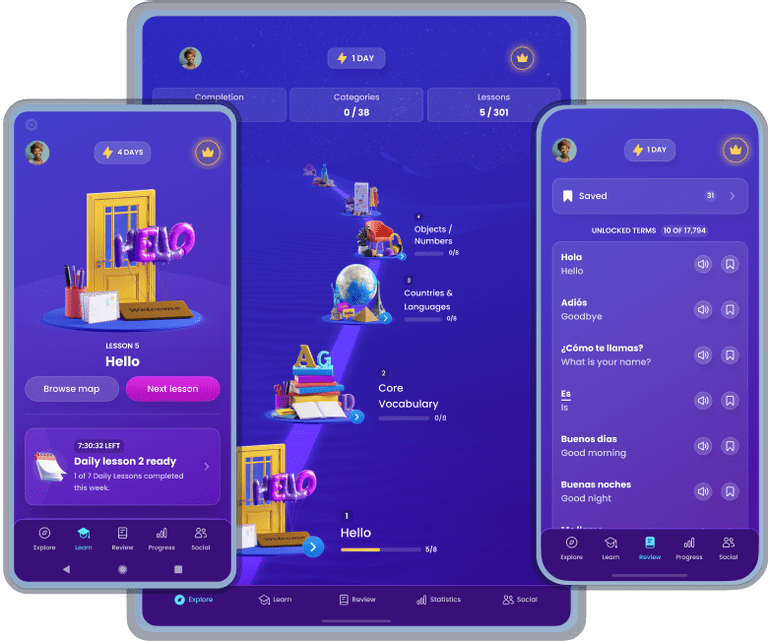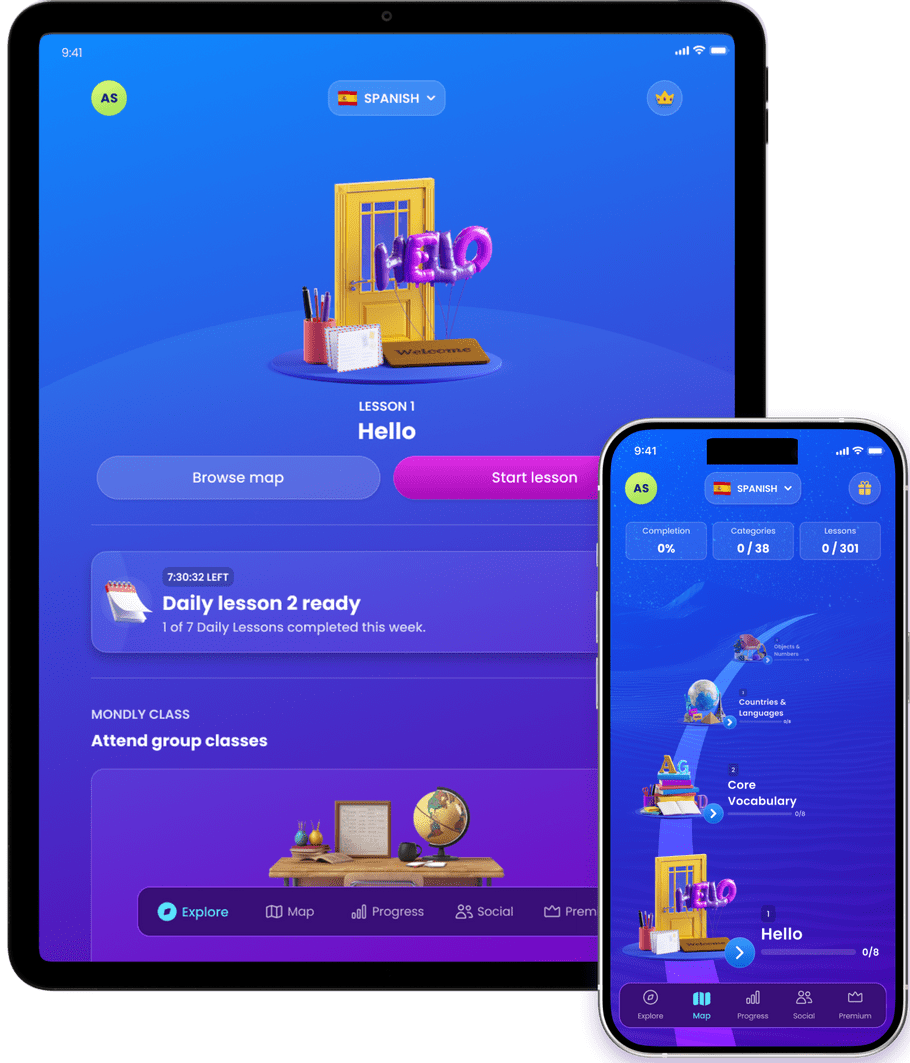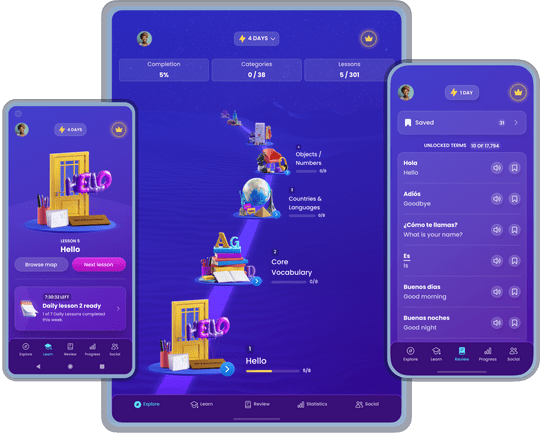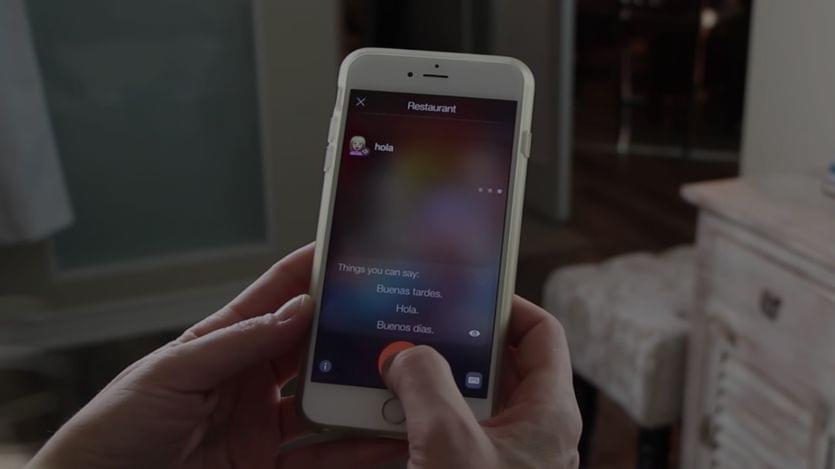How to speak Chinese fluently in no time
Discover how to speak Chinese fluently
Our language experts care deeply about your ability to have real conversations in Chinese as fast as possible. That's why, rather than bombarding you with complex notions at the beginning of your course, we start by involving you in a real conversation. Through this approach, you will be able to have your first Chinese conversation after only 5 minutes of using our app. Encouraging, right?

Speak Chinese fluently from day 1
Did you know that learning by doing is the most effective learning method? Practice Chinese a little bit every day and you’ll speak like a native forever! Start right now with these top 10 most common Chinese words and phrases pronounced by fluent Chinese speakers.
1. 你好。 = Hello.
First impressions matter. Don’t let anyone tell you otherwise. Learning as little as “hello” in Chinese can work wonders in your interactions with the natives. So here’s exactly how to pronounce it:
你好。
2. 你好吗? = How are you?
The next polite thing to do is ask “how are you?”. Sometimes, you can even skip the hello and directly ask how things are going. Here’s how to pronounce it in Chinese:
你好吗?
3. 你叫什么名字? = What is your name?
When you travel abroad, you usually make a lot of new friends. Whether we are talking about the nice stranger on the plane, your host, or the driver, here’s how to ask them what their name is:
你叫什么名字?
4. 我很高兴见到你。 = Nice to meet you.
The natives will always regard your attempt to speak their language as a sign of respect towards their culture. Another basic phrase you can use when making new friends is “nice to meet you”. Click and listen to how is it pronounced:
我很高兴见到你。
5. 请。 = Please.
Manners are a must everywhere you go. And China makes no exception. Saying “please” the right way and at the right time will open many doors in your path. To pronounce it in Chinese, you simply say:
请。
6. 谢谢你。 = Thank you.
Mothers are the best thing that ever happened to us. Not only did they raise us, but they also taught us basic manners like saying “thank you” in the proper context. Following their example, here’s how to say “thank you” in Chinese:
谢谢你。
7. 不用客气。 = You're welcome.
It doesn't matter where you are in the world. Common sense translates the same in all languages. Here's how a person from Beijing would say “you’re welcome”:
不用客气。
8. 对不起, 打扰了! = Excuse me!
We only need 7 seconds to make an impression that may last a lifetime. And sometimes, the only difference between a good impression and a bad one is just a simple “excuse me”. Listen to how it's pronounced in Chinese:
对不起, 打扰了!
9. 这个多少钱? = How much does it cost?
Shopping sprees are an essential part of every city break. The vacation isn’t over until you buy souvenirs for each member of your family. So here’s how to ask “how much does it cost?” in Chinese:
这个多少钱?
10. 再见。 = Goodbye.
If you want to maintain the good first impression you managed to make with your flawless Chinese greetings and introductions, end the conversation by saying “goodbye” exactly like a native:
再见。




1 000 000+ + Ratings
Mondly was named "Editors' Choice" in Google Play and "Best New App" by Apple.
Chinese conversations for perfect pronunciations


Learning to speak Chinese in Virtual Reality
Meet Mondly VR, the first virtual reality application that helps you learn to speak Chinese. Put your VR headset on and feel immersed in a world of languages. Order some sweet and sour chicken in a restaurant in Shanghai, have an exciting Chinese conversation in on a train going to Beijing or check into a hotel in Hong Kong. It’s the closest thing to being there and that’s exactly what makes it so effective in learning Chinese.
Remember that deer in the headlights feeling when someone asks you a question and you desperately dig through your memory trying to figure out what to say in response? In VR, you learn how to speak Chinese by practicing the same situations in the comfort of your own home. Practice as many times as you like in a safe environment and get instant feedback until you get it right. As a result, you’ll gain the confidence to apply what you have learned in the real world. Ultimately, Mondly is all about teaching you how to speak Chinese so you can have real-life conversations with natives. No doubt about it, Mondly VR supercharges your learning and makes learning to speak Chinese extremely effective.


Did you know?

What’s extremely important to know when you speak Mandarin Chinese is that there are 4 different tones: flat, rising, falling, rising, and falling. Fortunately, the 4 tones are easily learned in Pinyin, the version of Chinese that uses Roman characters. The rising tone is represented by an upward sign above a letter(á), the flat one by a horizontal line(ā), the falling tone by a downward sign(à), and the rising and falling tone by an upward and downward sign(ǎ). There is also a neutral tone which means there is no tone or sign on a letter(a).
Tones matter because phrases with a falling tone might mean a thing and one with a rising and falling tone might mean a totally different thing. For example, “wǒ xiǎng wèn nǐ” (我想问你) means “I want to ask you something” while the very similar “wǒ xiǎng wěn nǐ” (我想吻你) means “I want to kiss you”.

Speaking Chinese has major benefits

Being able to speak with over 1 billion Chinese speakers
Chinese is the most spoken language worldwide, so you'll definitely have a lot to gain by learning conversational Chinese. For example, you'll be able to interact with people anytime you visit China, Hong Kong, or Taiwan.

Traveling to Chinese speaking countries gets way better
Wherever you plan to travel to China, Hong Kong, or Taiwan, speaking Chinese will enhance your experience significantly. You will be able to experience Chinese-speaking countries like a native and have an authentic experience in the process.

Speaking Chinese can save your career
Being able to speak Chinese increases your employability significantly and makes you stand out from the crowd. This means that you will have better chances of getting a well-paid job in the first place, better chances of getting promoted or getting a better job in a Chinese-speaking country.

Speaking Chinese makes you smarter
Studies indicate that being bilingual or a polyglot increases the grey matter in your brain. This means that speaking Chinese makes you smarter than you currently are. So, what are you waiting for?














